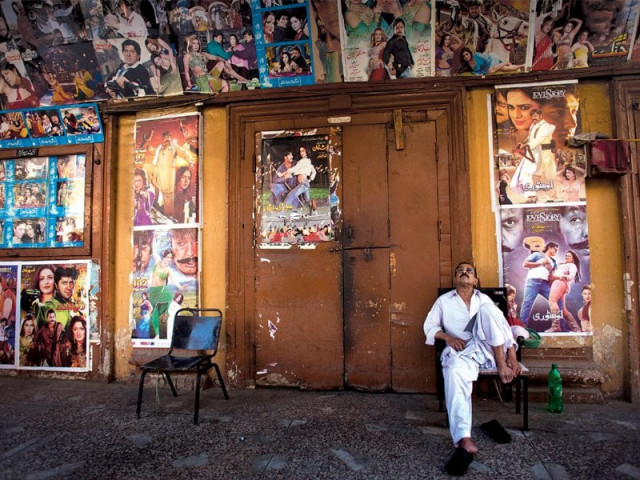Dying art: The last of the warriors
Most local cinemas have been converted to shopping malls.

Projectionist Asghar Ali laments the industry’s present state. PHOTO: MYRA IQBAL/EXPRESS
Cinemas, once a place to dream regardless of social class, are no longer a poor man’s respite. In the onslaught of suave movie theatres — Cinepax, Arena and Cine Gold — the case for preserving cinematic treasures such as the pre-partition Khurshid Cinema in Rawalpindi is weak at best.

Khursheed Cinema barely gets any visitors these days (left), projectionist Asghar Ali (top) laments the industry’s present state. PHOTO: MYRA IQBAL/EXPRESS
In the vibrant Raja Bazaar, where donkey carts, pedestrians, stray dogs, taxis and vendors collide in an endearing cultural landscape, framed between the crumbling remains of pre-partition architecture, lies Khurshid Cinema, tucked behind its unassuming gates.
Running mostly on severe losses, the cinema caters to the male Pakhtun working class that populates the bazaar, screening only Pashto films.
While the matinee show is on, gatekeeper Talha Mohammad fans himself at the entrance. Behind him, rises a shrine of garish movie posters with feisty, well-endowed heroines and their burly, middle-aged saviors, whose machismo is implied through the number of arms, joints and women they flaunt.

Khursheed Cinema barely gets any visitors these days projectionist Asghar Ali (top) laments the industry’s present state. PHOTO: MYRA IQBAL/EXPRESS
Mohammad, who has worked at the cinema for over two decades, says “I don’t watch the films; they are vulgar and signal the world’s end”.
Not a single fan reels inside, and less than a dozen of the 400 chairs are occupied. The audience is amused as a hefty heroine jumps out from behind sunflowers and begins to dance in unimaginable ways, while the potbellied, wig donning hero dances with only his eyes.
In the projection room, two stories above, and twice as scorching, Asghar Ali, ensures a smooth show.

“The nature of films has changed,” he shares, adding that “action-packed violent sequences, vulgar dance numbers and domestic feuds have injected the political into what was once wholesome entertainment”.
Ali feels that with increasing taxation on entertainment and widening social differences, cinema-goers in the area are few and far: “A 100 rupee movie show is a luxury”.
The cinema’s manager is 60-year-old Shafqat Ali who began working here as a projectionist 40 years ago and made his way to the top.
He struggles to remember the last time a family came to his cinema. His clientele is limited to Pakhtun taxi-drivers, hotel waiters and shopkeepers who inhabit the market and ache, every so often, for a whiff of home, even if it is a barely accurate depiction.
“There was a time when the house was full, with two canteens and vendors selling flowers, burgers, toffees and cigarettes.” It is a little difficult to imagine that now, with a single haunted canteen and lazing employees outside.
Rawalpindi was once home to more than 16 cinema houses but few managed to endure high entertainment taxes, production decline and the complex state of hypocrisy that persevered in the decades that followed Ziaul Haq’s boot-induced religious conservatism.
Khurshid Cinema was bombed in 1990, killing seven and encasing movie-lovers in fear and a ban on films in 1997 by Jamaat-i-Islami, during the PML-N government, heralded the decline of Pakistani films, and the culture of local cinema.
“Gulistan, Novelty and Taj Mahal cinemas are all plazas now,” explained Ali, in a manner that reflected his peace with the demise of local cinema houses.
The Ministry of Culture was devolved after the 18th Amendment was passed, leaving the ailing film industry in a lurch. In a half-hearted bid to salvage the industry, the government proposed the development of a “national framework for films”, which would comprise of industry experts invested in the revival of the industry. Unsurprisingly, this council is yet to materialise.

Simple accounting relates that the battle for reviving local cinema is lost, but a little investment could resuscitate the last of the old cinemas standing their ground for the deprived and the nostalgic.
Published in The Express Tribune, July 1st, 2013.



















COMMENTS
Comments are moderated and generally will be posted if they are on-topic and not abusive.
For more information, please see our Comments FAQ